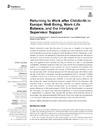Identificador persistente para citar o vincular este elemento:
https://accedacris.ulpgc.es/jspui/handle/10553/41823
| Título: | Returning to work after childbirth in Europe: well-being, work-life balance, and the interplay of supervisor support | Autores/as: | Lucia-Casademunt, Ana M. García-Cabrera, Antonia M. Padilla-Angulo, Laura Cuéllar-Molina, Deybbi |
Clasificación UNESCO: | 6306 Sociología del trabajo | Palabras clave: | Human-Resource Management Family Conflict Job-Satisfaction Health Performance, et al. |
Fecha de publicación: | 2018 | Proyectos: | El Cambio Regulativo, Normativo y Cognitivo-Cultural Como Promotor Del Emprendimiento Internacional de la Empresa Española. Propuestas de Adaptación E Innovación Institucional | Publicación seriada: | Frontiers in Psychology | Resumen: | Parents returning to work after the arrival of a new son or daughter is an important question for understanding the trajectory of people's lives and professional careers amid current debates about gender equality and work-life balance (WLB). Interestingly, current research concludes that general WLB practices at the workplace may be necessary in the specific case of women returning to work after childbirth because of the particular maternal and infant factors involved. However, WLB practices as a flexible arrangement may work against women because they may be viewed as a lack of organizational commitment. Therefore, research on this topic could benefit from considering supervisor support as a complement of such practices, but previous research has analyzed WLB and supervisor support separately and scarcely. To fill this gap in the literature, we use two sub-samples of 664 female employees and 749 male employees with children under the age of one from 27 European countries participating in the 6th European Working Conditions Survey (EWCS-2015) to study the impact of perceived WLB on European women's perceived well-being after childbirth, in contrast with previous literature. We also analyze the impact of perceived supervisor support (SS) and its interaction with perceived WLB on women's well-being after childbirth, and explore differences with men after childbirth, a collective underexplored by the literature. We find significant gender differences on the relative impact of WLB, SS, and their interaction on perceived job well-being. Our results have important implications for human resource practices in organizations. In particular, they suggest that gendered WLB practices should be encouraged, and stress the relevance of the human factor over human resource practices in addressing the difficulties that women returning to work face after childbirth. | URI: | https://accedacris.ulpgc.es/handle/10553/41823 | ISSN: | 1664-1078 | DOI: | 10.3389/fpsyg.2018.00068 | Fuente: | Frontiers in Psychology [ISSN 1664-1078], v. 9(68) |
| Colección: | Artículos |
Citas SCOPUSTM
30
actualizado el 08-jun-2025
Citas de WEB OF SCIENCETM
Citations
35
actualizado el 15-feb-2026
Visitas
140
actualizado el 13-jul-2024
Descargas
166
actualizado el 13-jul-2024
Google ScholarTM
Verifica
Altmetric
Comparte
Exporta metadatos
Los elementos en ULPGC accedaCRIS están protegidos por derechos de autor con todos los derechos reservados, a menos que se indique lo contrario.
